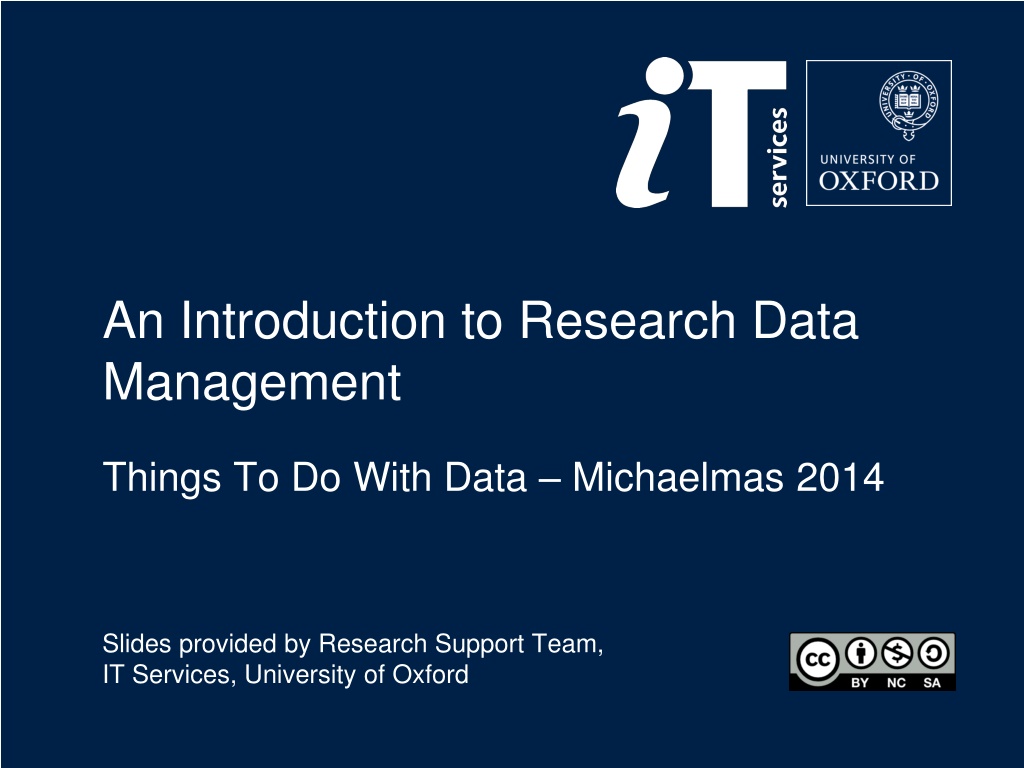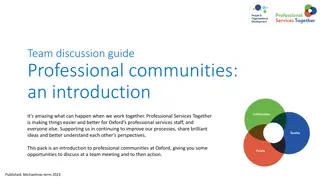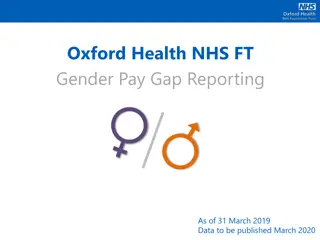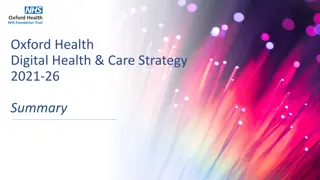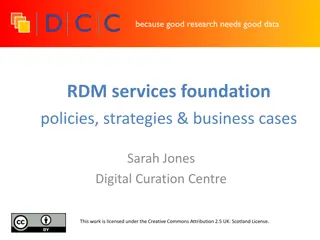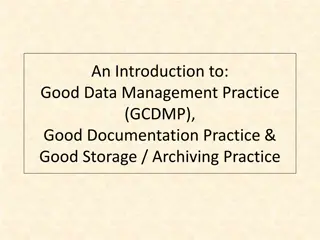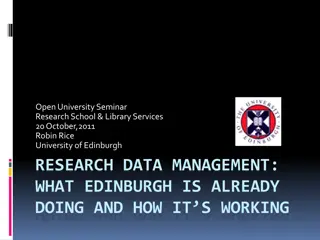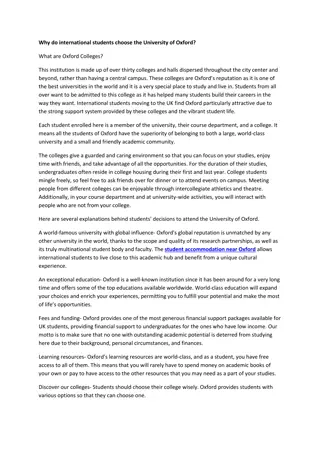Effective Research Data Management Practices at University of Oxford
Explore the importance of research data management including what data includes, tasks it covers, and its relevance throughout the research process. Learn about University of Oxford's policy on research data management, funders' requirements, and the tools available to support efficient day-to-day work.
Download Presentation

Please find below an Image/Link to download the presentation.
The content on the website is provided AS IS for your information and personal use only. It may not be sold, licensed, or shared on other websites without obtaining consent from the author. Download presentation by click this link. If you encounter any issues during the download, it is possible that the publisher has removed the file from their server.
E N D
Presentation Transcript
An Introduction to Research Data Management Things To Do With Data Michaelmas 2014 Slides provided by Research Support Team, IT Services, University of Oxford
What does data include? A reinterpretable representation of information in a formalized manner suitable for communication, interpretation, or processing. Digital Curation Centre Slide adapted from the PrePARe Project
What does data include? Any information you use in your research Slide adapted from the PrePARe Project
What does research data management cover? Organizing Structuring Storage Choosing technology Preservation Sharing Versioning Backing up Curation Documenting Security
Relevant throughout the research process Planning and applying for funding Day-to-day work during the project Setting up and starting work Project conclusion
Carrots and sticks Enable efficient day- to-day work More time for the meat of the research process Avoid problems in the future University of Oxford Policy on the Management of Research Data and Records Funding body requirements
University of Oxford policy Introduced Introduced July July 2012 2012
University of Oxford policy The full policy can be viewed on the Research Data Oxford website Research data is defined as the information needed to support or validate a research project s observations, findings or outputs Research data should be: Accurate, complete, identifiable, retrievable, and securely stored Able to be made available to others
Funders requirements Funding bodies are taking an increasing interest in what happens to research data You may be required to make data publicly available at the end of a project Many funders require a data management plan as part of grant applications RDO website provides a summary of requirements
Planning and applying for funding Day-to-day work during the project Setting up and starting work Project conclusion
Data management plans A document created early on in a project While planning, applying for funding, or setting up An initial plan may be expanded later Details plans and expectations for data Nature of data and its creation or acquisition Storage and security Preservation and sharing
Benefits of data management plans Ask key questions before problems arise Have time to look for solutions Saves time and reduces stress Many tasks are straightforward if planned from the beginning, but much harder in retrospect A framework for ongoing review of data management practices
DMP Online Online data management planning tool Can be customized according to funding body https://dmponline.dcc.ac.uk/
Planning and applying for funding Day-to-day work during the project Project conclusion Setting up and starting work
What storage media are in use? How about file formats? Slide adapted from the PrePARe Project
Storage Departmental IT support may be able to provide server space or a shared drive IT Services NSMS offers server rental and management, storage on the University s private cloud, and other storage solutions
Data security Is there data that needs special treatment? Sensitive or confidential information Commercial potential InfoSec at IT Services can provide advice see http://www.it.ox.ac.uk/infosec/ for more details
Backing up is easier than replacing lost data http://blogs.ch.cam.ac.uk/pmr/2011/08/01/why-you-need-a-data-management-plan/ Slide adapted from the PrePARe Project
LOCKSS Lots Of Copies Keeps Stuff Safe Keep copies in different places Can the process be automated? Slide adapted from the PrePARe Project
IT Services: data back-up on the HFS HFS is Oxford s central back-up and archiving service Free of charge to University staff and postgraduates Automated back-ups of machines connected to University network Copies kept in multiple places
Choosing the right tools for the job Are current software and methods meeting your needs? Sticking with old familiars can be false economy Ask friends and colleagues for recommendations
Tools and technologies for managing data Spreadsheets may be fine for small, straightforward tasks More complex projects might benefit from a relational database Microsoft Access, FileMaker Pro, etc. Or a qualitative data analysis package Nvivo, Atlas.ti, etc. Or an XML database...
ORDS Online Research Database Service Specifically designed for academic research data Cloud-hosted and automatically backed up Web interface makes collaboration straightforward If desired, databases can easily be made public Designed to permit easy archiving Launched in the summer of 2014 http://ords.ox.ac.uk/
Other data management tools and systems LabTrove an electronic lab notebook system NeuroHub an information environment for managing data from lab-based research DataStage a secure personalized file management environment myExperiment record and share scientific workflows Taverna for managing scientific workflows
Research Skills Toolkit Website and hands- on workshops A guide to software, University services, and other tools and resources for research http://www.skillstoolkit.ox.ac.uk/
Planning and applying for funding Setting up and starting work Project conclusion
MAKE SURE YOU CAN UNDERSTAND IT LATER What s obvious now might not be in a few months, years, decades Adapted from Clay Tablets with Linear B Script by Dennis, via Flickr: http://www.flickr.com/photos/archer10/5692813531/ Slide adapted from the PrePARe Project
Documentation and metadata Documentation is the contextual information required to make data intelligible and aid interpretation A users guide to data May be given at study level or data level Metadata is similar, but usually more structured Conforms to set standards Machine readable
Documentation what needs to be included Who created the data, when and why Description of the item Methodology and methods Units of measurement Definitions of jargon, acronyms and code References to related data Slide adapted from the PrePARe Project
Maintaining consistency Agree a set of standard working practices as early as possible in a project Method of recording what s been done to data and who did it File naming conventions Version information Have these clearly documented, and store the documentation centrally
Planning and applying for funding Day-to- day work during the project Setting up and starting work Project conclusion
Long term solutions Data repositories or archives offer a secure long-term home for research data Data can be embargoed if needed Databib and Re3Data.org offer searchable catalogues of repositories Figshare offers a DIY option
ORA-Data (formerly known as DataBank) University of Oxford s institutional data archive Will work alongside ORA-Publications to form a composite University archive Long term preservation for datasets without another natural home Plus records for data archived elsewhere
Planning ahead Data sharing needs to be planned from the beginning of a project With sensitive data, consent may be needed Third party data may come with restrictions If data is destined for a particular archive, they may have specific requirements Do they use a specific metadata schema, for example?
Data licensing A licence clarifies the conditions for accessing and making use of a dataset User knows what s allowed without asking further permission Doesn t exclude possibility of specific requests to go beyond the terms of the licence Licences used for data include Creative Commons and Open Data Commons
Digital Curation Centre A national service providing advice and resources for the whole research data lifecycle http://www.dcc.ac.uk/
UK Data Archive Largest UK collection of social sciences and humanities data Advice on best practice for creating, preparing, storing and sharing data http://www.data-archive.ac.uk/
IT Services: Research Support Team Can assist with technical aspects of research projects at all stages of the project lifecycle Help with DMPs, selecting software or storage, modelling data, etc. But the earlier you seek advice, the better For more information, see: http://research.it.ox.ac.uk/
Research Data Oxford website Oxford s central advisory website University policy is available Questions? Email researchdata @ox.ac.uk http://researchdata.ox.ac.uk/
Any questions? Ask now, or email us on researchdata@ox.ac.uk
Rights and re-use This presentation is part of a series of research data management training resources prepared by the Research Support Team at IT Services, University of Oxford. Parts of this slideshow draw on material produced as part of the Oxford-based DaMaRO Project, and on resources produced by the PrePARe Project With the exception of clip art used with permission from Microsoft, and commercial logos and trademarks, and images specifically credited to other sources, the slideshow is made available under a Creative Commons Attribution Non-Commercial Share-Alike License Within the terms of this licence, we actively encourage sharing, adaptation, and re-use of this material
